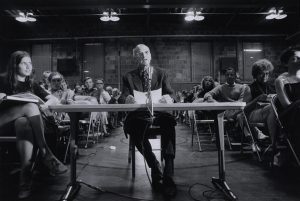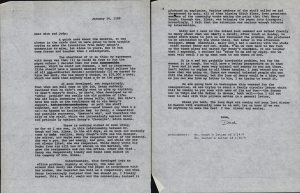Main Exhibit Page | Too Close to his Sources? | Scotty Writes His Memoirs | Credits and Exhibit Sources

Found in RS 26/20/120, Box 145, Folder: Hough, Henry, 1967-1997
Country Editor
In his later years, Scotty found himself drawn to country living and small-town newspapers. Like most of his colleagues, Scotty harbored fantasies of escaping the pressures of the city and owning a small community paper.[1] During one of his vacation with Sally in 1967 at Martha’s Vineyard, an island off the coast of Massachusetts, Scotty met Henry Beetle Hough, the irascible owner of the Vineyard Gazette, the island’s weekly newspaper. At the time, Hough was attempting to sell the paper after the 1965 death of his wife, Betty. Hough believed Scotty, one of the most venerated reporters in the United States, was the perfect candidate to continue the traditions he and his wife upheld during their 40 plus years’ stewardship of the newspaper.[2]
Indeed, Henry and Betty Hough acquired a legendary status among the island’s residents after purchasing the Vineyard Gazette in 1920, reporting on village life and leading environmental crusades against overdevelopment on Martha’s Vineyard.[3] Although Scotty was initially hesitant about purchasing the paper, Hough’s friend, Don Hurley, a Boston lawyer, urged Scotty to buy the newspaper, fearing the Gazette would fold if Hough died. Hurley arranged for Fairleigh Dickinson, a wealthy vacationer on Martha’s Vineyard, to loan Scotty $50,000 to purchase the Gazette. Scotty financed the rest of the purchase by selling some his New York Times stock.[4] On March 22, 1968, Scotty and Sally officially became owners of the Vineyard Gazette.[5] Scotty would finally have a chance to own a country newspaper.
Troubled Waters
Scotty and Sally discovered the challenges of owning a small town newspaper early in their tenure as proprietors of the Vineyard Gazette. Dissatisfied personnel quickly demanded higher salaries based on their mistaken assumption that the couple was wealthy because of Scotty’s position at the Times.[6] Scotty sent a flurry of memos to the Gazette staff in the late 1960s and early 70s, repeatedly reminding them that, contrary to popular opinion, he was not exorbitantly rich [7], and that the paper was barely making a profit. The Gazette’s financial statement for fiscal 1971 revealed, for example, that, while the Gazette saw its revenue increase to $20,000, the paper’s operating losses rose from $15,235.34 to $19.410.83.[8] The majority of these problems stemmed form the fact that Scotty and Sally were absentee owners: they were unwilling to remove themselves from Washington D.C. and dedicate their lives to managing the Gazette.[9] By 1975, Scotty turned to his eldest son and daughter-in-law, Richard (Dick) and Jody Reston, to rescue the Vineyard Gazette.

Dick and Jody
Dick and Jody Reston were natural choices to run the Gazette since Dick was the only Reston son to pursue a career in journalism, having spent the majority of his career at the Los Angeles Times.[10] Although the couple was hesitant to move to Martha’s Vineyard, Scotty persuaded them to take the reigns by sending them letter chronicling the Gazette’s interoffice rivalries and dire financial straits.[11] Upon Dick and Jody’s arrival at Martha’s Vineyard, the couple divided their responsibilities: Jody managed the paper’s finances, ensuring the Gazette sold advertising space, thereby increasing revenues, while Dick reoriented the paper to community issues.[12] After several years of diligent work, the paper was in the black, earning 3 million in annual revenues and 18,000 subscribers by 1999.[13] Although Scotty was proud of his son and daughter-in-law’s accomplishments at the Vineyard Gazette, he never became a fabled country editor. Instead, he directed his energies to his final professional endeavor–his memoirs.
Richard Reston discusses his father’s reasons for purchasing the Vineyard Gazette, ca. 1999. Found in RS 26/20/157, Card File Box 2: Reston, Dick.
Continue to: Scotty Writes His Memoirs
Footnotes
[1] John F. Stacks, Scotty: James B. Reston and the Rise and Fall of American Journalism (Boston: Little, Brown, 2003), 280; James Reston, Deadline: A Memoir (New York: Random House, 1991), 252, 255, 357-358; James Reston, Washington (New York: Macmillan, 1986), 231, 233, 250-252.
[2] Phyllis Meras, Country Editor: Henry Beetle Hough and the Vineyard Gazette (Bennington: Images from the Past with the Martha’s Vineyard Historical Society, 2006), 141-144.
[3] Reston, Deadline, 358-359, 362; Stacks, Scotty, 279; Meras, Country Editor, 49-50, 123-124, 126.
[4] Stacks, Scotty, 278-280; Tape Recorded Interview with Richard Reston, September 27, 1999, John F. Stacks Papers, 1914-2003; Record Series 26/20/157, Card File Box 2, University of Illinois Archives.
[5] James Reston, “The Vineyard Gazette 1989,” James B. Reston Papers, 1935-1995; Record Series 26/20/120, Box 10, Folder: The Vineyard Gazette 1989, University of Illinois Archives.
[6] Meras, Country Editor, 172-174.
[7] James Reston to Gazette Staff, March 31, 1969, Box 135: Vineyard Gazette—General Correspondence 1967-1993.
[8] James Reston to the Staff of the Gazette, June 24, 1971, Box 135, Folder: Vineyard Gazette—Photographs and Correspondence 1971-1973.
[9] Stacks, Scotty, 281; “Tape Recorded Interview with Dick Reston,” Card File Box 2.
[10] Stacks, Scotty, 285-86.
[11] James Reston to Dick and Jody Reston, January 16, 1969, Box 145, Folder: Hough, Henry 1967-1997; James Reston to Dick and Jody Reston, February 9, 1974, Box 135, Folder: Vineyard Gazette—Business Manager’s Reports, 1973-1986.
[12] Stacks, Scotty, 287-288; “Tape Recorded Interview with Dick Reston,” Card File Box 2.
[13] Stacks, Scotty, 290.